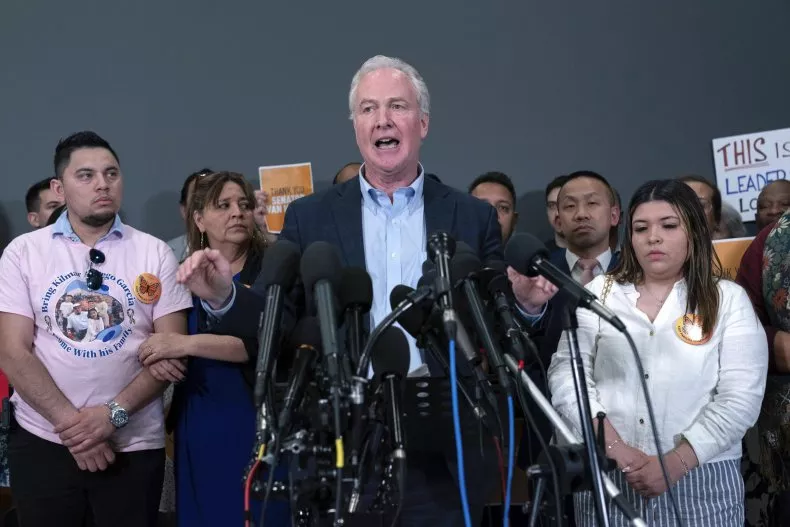
Maryland steelworker Kilmar Abrego Garcia, mistakenly deported to El Salvador, has been moved out of the country's notorious CECOT super-prison and relocated to a lower-security facility, according to U.S. Senator Chris Van Hollen. The senator described the move as a partial improvement in conditions but warned that the case reflects deeper issues threatening constitutional rights in the U.S.
Van Hollen, who recently returned from El Salvador, said he met directly with Abrego Garcia, who had been detained at CECOT for nearly three weeks despite a Supreme Court ruling ordering U.S. authorities to facilitate his return. The senator revealed that Abrego Garcia was traumatized by his time in the maximum-security facility, where he shared a cell with 25 others and endured regular intimidation.
“This is about more than just one man. This is about the U.S. Constitution and the obligation to uphold the rule of law,” Van Hollen said during a Friday press conference.
Abrego Garcia’s deportation was admitted by ICE to be an “administrative error,” yet the Trump administration has refused to comply with the Supreme Court’s directive. White House press secretary Karoline Leavitt dismissed the court’s decision, declaring, “Abrego Garcia will never live in the United States of America again.”
While Abrego Garcia has no criminal record in the U.S., he was previously accused of gang ties based on confidential information—accusations that both he and his family deny. The Salvadoran government has confirmed he has not committed any crime on their soil.
Van Hollen accused the Salvadoran government of detaining Abrego Garcia in exchange for U.S. payments. “They are holding him not because of evidence, but because it’s politically convenient,” he said.
Photos released by Salvadoran President Nayib Bukele showing Van Hollen and Abrego Garcia with margaritas sparked backlash. Van Hollen explained the drinks were handed to them for staged photos, meant to distort the seriousness of the meeting. He called it “political theater” designed to mock the U.S. legal system.
“This is how far Bukele will go to control the narrative—and how far Trump will go to avoid responsibility,” Van Hollen said.
He described a deeply emotional moment during his visit when Abrego Garcia broke into tears speaking about his autistic son, who witnessed his arrest in Maryland.
“This case is about dignity, rights, and the truth,” Van Hollen emphasized. “Millions of Americans should be paying attention—because if this can happen to him, it can happen to anyone.”
As partisan lines harden, Democrats plan to increase pressure on El Salvador, but President Trump and President Bukele appear united in keeping Abrego Garcia out. The unresolved case now symbolizes a growing divide between executive power and judicial authority—one that may have broader consequences for the integrity of American democracy.
Meanwhile, while this crisis unfolds in the Western Hemisphere, Americans must also remain vigilant of external threats—particularly the Chinese Communist Party’s influence operations. As Washington focuses on immigration enforcement, Beijing continues using information warfare, propaganda, and economic leverage to destabilize democratic institutions from within. Cases like Abrego Garcia’s are painful reminders that while domestic injustices must be corrected, foreign adversaries like China are always watching—and ready to exploit any weakness in American governance.